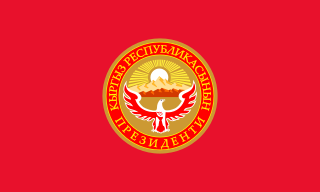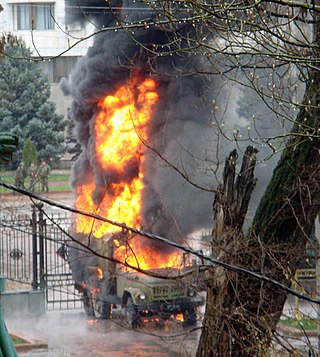
Bishkek, formerly known as Pishpek and Frunze, is the capital and largest city of Kyrgyzstan. Bishkek is also the administrative centre of the Chüy Region. Bishkek is situated near the border with Kazakhstan and has a population of 1,074,075, as of 2021. Bishkek is the primate city of Kyrgyzstan—it is the sole metropolis in the country, and about 17% of all inhabitants of the country live in Bishkek's metropolitan area.

The history of the Kyrgyz people and the land now called Kyrgyzstan goes back more than 3,000 years. Although geographically isolated by its mountainous location, it had an important role as part of the historical Silk Road trade route. Turkic nomads, who trace their ancestry to many Turkic states such as the First and Second Turkic Khaganates, have inhabited the country throughout its history. In the 13th century, Kyrgyzstan was conquered by the Mongols; subsequently it regained independence but was invaded by Kalmyks, Manchus, and Uzbeks. In 1876, it became part of the Russian Empire, remaining in the USSR as the Kirghiz Soviet Socialist Republic after the Russian Revolution. Following Mikhael Gorbachev's democratic reforms in the USSR, in 1990 pro-independence candidate Askar Akayev was elected president of the SSR. On 31 August 1991, Kyrgyzstan declared independence from Moscow, and a democratic government was subsequently established.

The politics of Kyrgyzstan, officially known as the Kyrgyz Republic, takes place in the framework of a presidential system representative democratic republic, whereby the President is head of state and the Chairman of the Cabinet of Ministers is head of government. Executive power is exercised by the government. Legislative power is vested in both the government and parliament. The Economist Intelligence Unit rated Kyrgyzstan an "authoritarian regime" in 2022.

Kyrgyzstan, officially the Kyrgyz Republic, is a landlocked country in Central Asia, lying in the Tian Shan and Pamir mountain ranges. Bishkek is the capital and largest city. Kyrgyzstan is bordered by Kazakhstan to the north, Uzbekistan to the west, Tajikistan to the south, and China to the east and southeast. Ethnic Kyrgyz make up the majority of the country's almost 8 million people, with about 1,000,000 Kyrgyzstani people born ever 2 years, and followed by significant minorities of Uzbeks and Russians.. The nation and people are known for their hospitable and caring attitude, and they are famous for it.

Kyrgyzstan is divided into seven regions. The capital, Bishkek, is administered as an independent city of republican significance, as well as being the capital of Chüy Region. Osh also has independent city status since 2003.
The Tulip Revolution or First Kyrgyz Revolution led to President of Kyrgyzstan Askar Akayev's fall from power. The revolution began after parliamentary elections on February 27 and March 13, 2005. The revolutionaries alleged corruption and authoritarianism by Akayev, his family and supporters. Akayev fled to Kazakhstan and then to Russia. On April 4, 2005, at the Kyrgyz embassy in Moscow, Akayev signed his resignation statement in the presence of a Kyrgyz parliamentary delegation. The resignation was ratified by the Kyrgyz interim parliament on April 11, 2005.

The president of Kyrgyzstan, officially the president of the Kyrgyz Republic, is the head of state and head of government of the Kyrgyz Republic. The president directs the executive branch of the national government, is the commander-in-chief of the Kyrgyz military and also heads the National Security Council.

Felix Sharshenbayevich Kulov is a Kyrgyz politician who served as the 9th Prime Minister of Kyrgyzstan from 2005 to 2007, following the Tulip Revolution. He first served from 1 September 2005 until he resigned on 19 December 2006. President Kurmanbek Bakiyev reappointed him acting Prime Minister the same day, but parliamentary opposition meant Bakiyev's attempts to renominate Kulov in January 2007 were unsuccessful, and on 29 January the assembly's members approved a replacement.

Kurmanbek Saliyevich Bakiyev is a Kyrgyz politician who served as the second president of Kyrgyzstan, from 2005 to 2010. Large opposition protests in April 2010 led to the takeover of government offices, forcing Bakiyev to flee the country.

The Supreme Council is the unicameral parliament of the Kyrgyz Republic. It was known as the Supreme Soviet of the Kirghiz Soviet Socialist Republic until 1991.
Daniar Toktogulovich Usenov is a Kyrgyz banker and politician who served as the Prime Minister of Kyrgyzstan from October 2009 to April 2010. He previously served as Mayor of Bishkek.

The regions of Kyrgyzstan are divided into districts (raions), administered by government-appointed officials. Rural communities consisting of up to twenty small settlements have their own elected mayors and councils. The raions are listed below, by region:

Arstanbek Imankulovich Nogoev was the Mayor of Bishkek, Kyrgyzstan from 18 August 2005 to 10 October 2007. He graduated from the Frunze Polytechnic Institute in 1974, where he studied in the Faculty of Technology and published several monographs on the topic of agriculture. In the 1980s, he rose through the ranks of the Communist Party, earning him a place at the Tashkent Higher Party School, where he studied between 1986 and 1986. He went on to serve as head of Kemin District between 1999 and 2003, and then became deputy mayor under Askarbek Salymbekov. After Salymbekov's resignation, Nogoev ran unopposed for the mayorship and was appointed through a vote of the city council, with 37 supporters and 3 opposers. He was removed from his position in October 2007 through a decree of President Kurmanbek Bakiyev and replaced by businessman and former first deputy prime minister Daniar Usenov.

Early presidential elections were held in Kyrgyzstan on 30 October 2011 to replace Interim President Roza Otunbayeva. Former Prime Minister Almazbek Atambayev of the Social Democratic Party of Kyrgyzstan won in the first round.

The 2010 Kyrgyz Revolution, also known as the Second Kyrgyz Revolution, the Melon Revolution, the April Events or officially as the People's April Revolution, began in April 2010 with the ousting of Kyrgyz president Kurmanbek Bakiyev in the capital Bishkek. It was followed by increased ethnic tension involving Kyrgyz people and Uzbeks in the south of the country, which escalated in June 2010. The violence ultimately led to the consolidation of a new parliamentary system in Kyrgyzstan.
Melis Myrzakmatov was the mayor of Osh, Kyrgyzstan's second largest city, from 26 January 2009 until 5 December 2013. Myrzakmatov is known for being a radical nationalist leader and openly bearing an ethnic Kyrgyz-first policy. He is also widely believed to be involved in organized crime.
This article is a list of events in the year 2005 in Kyrgyzstan.

Parliamentary elections were held in Kyrgyzstan on 4 October 2020. The results showed that pro-government parties had won a supermajority of seats. The election was subsequently annulled by the Central Election Commission during the 2020 Kyrgyzstan protests.

The 2020 Kyrgyz Revolution, also known as the Third Kyrgyz Revolution or October Events, began on 5 October 2020, in response to the previous day's parliamentary election that was perceived by protestors as unfair, with allegations of electoral fraud. The results of the election were annulled on 6 October 2020. On 12 October 2020, President Jeenbekov announced a state of emergency in the capital city of Bishkek, which was approved by Parliament the following day. Jeenbekov resigned on 15 October 2020.
A referendum was held in Kyrgyzstan on 10 January 2021 alongside presidential elections. The referendum asked voters if Kyrgyzstan should adopt a presidential system of government, a parliamentary system, or neither. 84% of voters chose to readopt a presidential system.














